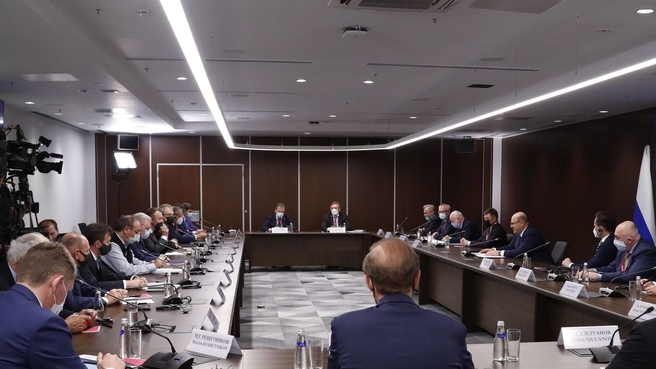The event was held ahead of the Innoprom 2021 International Industrial Trade Fair.
Good evening, friends. I am delighted to be welcoming all of you here, including our foreign colleagues who have managed to come despite the problems and restrictions due to the coronavirus infection.
We are meeting ahead of the Innoprom International Industrial Trade Fair. It will open tomorrow. This year we are holding it together with our Italian partners, who are attending this meeting. This is proof that over the past few years Innoprom has become a respected international platform, a place where major producers and leaders in their sphere meet to discuss industrial development scenarios.
Regrettably, we had to cancel the event last year due to the pandemic. Overall, the spread of the coronavirus created macroeconomic stability risks and unbalanced the industrial sector and global trade. On the other hand, it boosted digitalisation and catalysed a great many changes that were overdue in the industry. We are observing changes in the technological paradigm virtually before our very eyes.
Some sectors of the economy, namely retail trade, services and banking, have already made use of the new possibilities. Companies that have introduced new technologies now have a major competitive advantage on the market. They have already passed over to the next stage.
Digitalisation is gaining momentum throughout the world. Hardware and software are being created for digitalising production, introducing industrial robots and creating e-cars and e-buses. This is a sweeping global trend. The majority of the national economies are in the process of this technological upgrade. I would like to point out that in these new conditions it is especially important to build up the Russian industry in close collaboration with foreign countries, with our foreign partners based on the principles of mutually beneficial cooperation.
Our economy remains open to our European colleagues. We will continue improving the mechanisms of investment and technological partnership. Some of them have already been created for companies that apply innovative approaches. The so-called SPIC 2.0 stipulates the introduction of the most promising technologies on the global market. There are over 600 of them, and the list is being extended all the time. We will promote competencies in all of these spheres together with our international partners, making use of SPICs’ advantages, such as tax benefits, access to sectoral and regional subsidies, and participation in public procurement.
Today I would like to speak with you about the subjects that need our immediate attention, because digitalisation is changing all spheres, from science and complicated industries to everyday life.
These changes are creating new challenges for all economies throughout the world. New competencies are required on the labour market, and industrial facilities have already come against a shortage of skilled workers.
Another major topic that must not be ignored is the climate agenda. As of now, over 60 countries have approved low-carbon development strategies. The reduction of emissions is a major incentive for overhauling the economy as a whole and promoting new technology in industry, energy and the transport sector. This calls for the cross-cutting transformation of the economy as a whole.
I would like to know your position on these issues, which we are facing in the Russian Federation and in other countries as well.
Business has always been the first to feel any changes.













